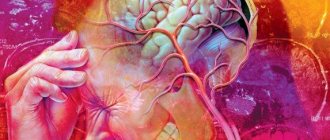Nausea
Nausea is a painful sensation of discomfort in the upper abdomen, esophagus and mouth; anticipation of vomiting. When describing such symptoms, patients say “I feel sick.” Sometimes the symptoms of nausea are less pronounced, in such cases they say “nauseous.” Nausea is often accompanied by weakness, sweating, and increased salivation. A person experiencing nausea may experience a decrease in blood pressure, become pale, and feel cold in the extremities.
Nausea - why? Possible causes of nausea
Diseases in which nausea is observed may relate to pathologies of the digestive, nervous, endocrine, cardiovascular and reproductive systems. Most often, nausea is a symptom of diseases of the gastrointestinal tract - both chronic (for example, gastritis, peptic ulcer, duodenitis, enterocolitis, cholelithiasis, pancreatitis, hepatitis, etc.) and acute (peritonitis, appendicitis, acute pancreatitis, acute cholecystitis and etc.) requiring immediate medical intervention.
Nausea can also be caused by reasons such as:
- pregnancy (morning sickness is often observed during the first trimester. It is caused by hormonal changes occurring in the body of the expectant mother);
- side effects of medications;
- toxic substances (poisoning);
- psychogenic causes (anxiety, severe fear, hysteria);
- overheating (hyperthermia), sunstroke.
Nausea in children
Children are no less susceptible to nausea than adults, and the symptom can be observed both before school and during classes. The reasons are often painful:
- CNS disorders (intracranial pressure, meningitis, epilepsy, hydrocephalus);
- gastrointestinal diseases (gastritis, colitis, appendicitis);
- pathologies of the endocrine system (including against the background of elevated sugar levels);
- poisoning (food, toxic, drug);
- worms.
In addition to nausea, there are accompanying symptoms that indicate the need for medical attention:
- elevated temperature;
- diarrhea, vomiting;
- blood impurities in urine, feces, vomit;
- cutting pain in the abdomen;
- respiratory arrest, severe headache, pale or bluish skin.
Children are often diagnosed with appendicitis, the primary manifestations of which are stool upset, impulsive pain in the navel or right side, dry mucous membranes and vomiting with bile. In the early stages, the appendix is successfully operated on; delaying treatment can result in peritonitis and death.
If nausea is observed in a child rarely and without additional complications, this may be a consequence of overwork, stress, or poor nutrition. Vomiting after sleep occurs due to the inability of the child's stomach to digest the fatty and heavy food that the baby ate the day before. Minimal consumption of light meals on the first day and an established diet will correct this problem in the future.
Going to school on an empty stomach is not the best option for a growing body. To avoid dizziness and fainting, a nutritious breakfast (cereal porridge with fruit) and a mandatory lunch are required. But what to do if the child is still small, and vomiting occurs unexpectedly?
In this case, you need to provide first aid:
- lay the child on his side (so that, lying on his back, he does not choke on vomit);
- to avoid dehydration, give mint tea, chamomile or rosehip infusion;
- reduce fever with antipyretics;
- give rehydration solution and antiemetic drug;
- wait for the doctor to arrive.
No ads 3
Nausea and frequent headaches
Nausea is often complained of simultaneously with recurring headaches. Such symptoms may indicate diseases of the nervous system. This could be: migraine, traumatic brain injury, meningitis, borreliosis. Also, nausea and headaches can be combined with diabetes and arterial hypertension.
Feeling unwell after a nap: main factors
Most people who decide to take a nap after lunch do so in completely inappropriate conditions. They usually fall asleep sitting or half-sitting in a bright room. Rarely lucky people can afford to lie down on a sofa, which, as a rule, is not the most comfortable.
After sleeping in an uncomfortable position for some time, a person rarely wakes up rested. Instead of the desired lightness in the body and clarity in the head, one feels weakness and heaviness throughout the body.
The main reasons for this are:
- Compression of blood vessels in the neck and temples. Due to the incorrect position of the head, the vessels in some areas are pinched, which leads to oxygen starvation, which is why headaches occur.
- Oxygen deficiency. It often happens that there is little air in the room where a person falls asleep. Lack of oxygen leads to poor health: a person may experience dizziness, pain throughout the body, and nausea.
- External noise. Even when a person manages to fall asleep to sound stimuli, they will interfere with his normal sleep. While in a relaxed state, the brain picks up noise and begins processing it. This negatively affects his work. Sometimes a person who falls asleep to the sound of the TV on starts having nightmares. As a result, when he wakes up, he feels neither vigor nor calm.
- A sharp jump in blood pressure. One of the common reasons for feeling unwell after a day's rest can be a sharp increase in blood pressure. The fact is that in the state of rest and relaxation into which the human body plunges during daytime sleep, blood pressure decreases. A sudden awakening leads to a sharp jump in blood pressure, which causes increased heart rate, headache, nausea, lethargy, and weakness.
- Interruption of deep sleep. People experience a feeling of exhaustion not only after taking a nap at lunch, but also in the morning, after a full night’s sleep. Those who do not follow a routine and always wake up when the alarm goes off are especially familiar with this unpleasant feeling. An abrupt exit from deep sleep provokes disruption of brain function. In order to return to normal after such a sudden awakening, sometimes you need to wait from 1.5 to 2 hours.
Types of naps by duration
If you are faced with the problem of why you feel bad after a nap, not for the first time, but you cannot do without such a rest, you will find the advice that the sympaty.net website has collected from various resources useful.
Nausea at night
Another common complaint is nausea at night . A sleeping person remains in the same position for a long time; the normal functioning of the body's systems is weakened. This leads to the fact that the feeling of discomfort accumulates, and, in the presence of pathological reasons, when you wake up, you can feel a strong attack of nausea.
Such attacks of nausea (in the morning or at night) can occur during pregnancy and be a consequence of toxicosis. Another cause may be hypothyroidism, a disease of the thyroid gland. Cardiovascular diseases (arterial hypertension, vegetative-vascular dystonia) can also cause nausea in the morning or at night. A common cause is diseases of the gastrointestinal tract (primarily gastritis and cholecystitis). In this case, nausea is usually accompanied by heartburn, pain and burning in the abdomen.
Why don't we feel rested after a short nap?
Very often it seems that a long afternoon nap will relieve fatigue and add strength and vigor. And when you finally get the long-awaited chance to take a nap on Sunday, after this siesta you feel as tired as before. Why is this happening? Science will explain everything According to the director of the Sleep To Live Institute, Robert Oxman, the causes of drowsiness are 2 main factors: the homeostatic factor of sleep and circadian rhythms. The homeostatic component is this: the longer you stay awake, the more chemicals accumulate in your brain. They ultimately “tell” you that it’s time to go to bed. The circadian rhythm is your internal biological clock. According to this clock, the body is awake at a certain time of the day (usually in the morning) and feels the desire to sleep (in the evening). When there is a violation of any of these 2 factors, the person feels drowsy. Scientists have also found that the duration of your nap directly affects how you feel when you wake up. According to NASA research, naps should last between 10 and 26 minutes to improve mental performance. Research also showed that a 26-minute nap improved alertness by 54%. If you sleep for more than 30 minutes during the day, you will smoothly move into the REM phase (rapid eye movement phase). Then you are likely to sleep for 90 minutes, which is a complete sleep cycle. Unfortunately, such a rest can disrupt cycadal rhythms and simply disrupt the usual daily routine, causing more harm than good.
Daytime sleep affects the quality of night sleep If lately you have been constantly feeling tired and distracted, whereas you are usually active and attentive, then with a high probability we can say that the reason lies in the quality of your sleep. To improve your overall health, you need to analyze how you sleep at night and during the day. Just ask yourself a few questions - this will help you determine what exactly negatively affects the quality of your sleep and rest.
- Do you often wake up after going to bed?
- Do you use your phone or laptop until the very moment you go to bed?
- Do you experience physical discomfort in the morning?
These are factors that may be causing your chronic fatigue, and it is important to identify any changes to improve your sleep quality. If you make up for the lack of sleep at night with daytime siestas, this could be the cause of your daytime fatigue. If you are worried that you will not be able to fully get the necessary hours of night rest, then it is better to contact a specialized store of goods for healthy sleep. Competent specialists will help you choose a sleeping place individually for you, which will allow you to get a good night's sleep and not fall asleep during the day.
Degrees of intoxication during a hangover
Vomiting is a natural reaction of the body to toxins the blood. With the help of urges, he begins to get rid of poisons so that as little toxic substances as possible enter the intestines. But the severity of symptoms depends on the stage of alcohol intoxication:
- Easy . A person feels sick without gagging. The person feels slightly dizzy, appetite disappears, and falls asleep. As a rule, after a few hours the work of internal organs and systems is restored without consequences. Within 1-2 days the condition returns to normal.
- Average . Vomiting is caused by swelling and disruption of the vestibular apparatus. Discomfort is increased by food odors, sudden movements, and dizziness complicates. Diarrhea and discharge mixed with bile often occur.
- Heavy . In case of poisoning, nausea develops into repeated vomiting. In humans, digestion and bile flow are disrupted, and the mucous membranes of the small intestine become inflamed. In a semi-conscious state, the risk of vomit being thrown into the respiratory tract increases.
In severe cases of intoxication, liver . It stops breaking down ethanol, so the level of toxins reaches a critical maximum.
Why does vomiting with bile occur?
Bile in vomit is another unpleasant sign of gallstone disease or inflammation of the gallbladder. Repetitions of the gag reflex occur every 2 hours, without bringing relief to the patient.
Morning vomiting with yellowing and itching of the skin indicates cholecystitis
Pancreatitis occurs with aching abdominal pain on the right, but lying down reduces the intensity of the pain. High body temperature, bloating, yellowing of the white membrane of the eyes are accompanying symptoms of liver disease, intestinal obstruction, and bile ducts.
Taking large amounts of alcohol and low-quality foods irritates the gastric mucosa and leads to vomiting. This is how the protective function of the body manifests itself, trying to fence itself off from incoming toxic substances. If over time it is accompanied by the release of bile, this indicates the development of serious problems with the gastrointestinal tract.
ATTENTION! Vomiting mixed with bile also occurs in the first trimester of pregnancy. The process is due to two reasons: hormonal changes in the body and exacerbation of chronic diseases (cholecystitis, duodenitis, pancreatitis).








